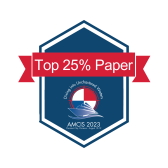Loading...
Paper Type
Complete
Description
Abstract The adoption of smart city technology has become increasingly popular in cities around the world. Internet of Things (IoT) devices, such as smart sensors, traffic lights and parking meters, are utilized in collecting and analyzing valuable data to improve the efficiency of critical infrastructure and enhance the quality of life for citizens. To increase the efficiency of its parking officers, the City of Los Angeles implemented a smart parking system on its streets in 2011. Utilizing transaction cost economics (TCE), we analyzed the number of parking citations in Los Angeles between 2015 and 2019 to examine the impact of smart parking meters on the parking officers’ efficiency. We hypothesized that smart parking meters and time limit policies, defined as the allowed parking duration, positively affect the number of parking citations. To test our hypothesis, we used a fixed-effect estimation model. Our results indicate that smart parking meters and time limit policies have positive effects on the number of parking citations, leading to an improvement in the efficiency of parking officers. We discussed the theoretical and practical implications of these findings for implementing IoT projects in the public sector.
Paper Number
1247
Recommended Citation
Ahmad, Alharbi, and Dincelli, Ersin, "Smart Parking Systems and their Impact on the Efficiency of Parking Officers" (2023). AMCIS 2023 Proceedings. 8.
https://aisel.aisnet.org/amcis2023/sig_adit/sig_adit/8
Smart Parking Systems and their Impact on the Efficiency of Parking Officers
Abstract The adoption of smart city technology has become increasingly popular in cities around the world. Internet of Things (IoT) devices, such as smart sensors, traffic lights and parking meters, are utilized in collecting and analyzing valuable data to improve the efficiency of critical infrastructure and enhance the quality of life for citizens. To increase the efficiency of its parking officers, the City of Los Angeles implemented a smart parking system on its streets in 2011. Utilizing transaction cost economics (TCE), we analyzed the number of parking citations in Los Angeles between 2015 and 2019 to examine the impact of smart parking meters on the parking officers’ efficiency. We hypothesized that smart parking meters and time limit policies, defined as the allowed parking duration, positively affect the number of parking citations. To test our hypothesis, we used a fixed-effect estimation model. Our results indicate that smart parking meters and time limit policies have positive effects on the number of parking citations, leading to an improvement in the efficiency of parking officers. We discussed the theoretical and practical implications of these findings for implementing IoT projects in the public sector.
When commenting on articles, please be friendly, welcoming, respectful and abide by the AIS eLibrary Discussion Thread Code of Conduct posted here.




Comments
SIG ADIT